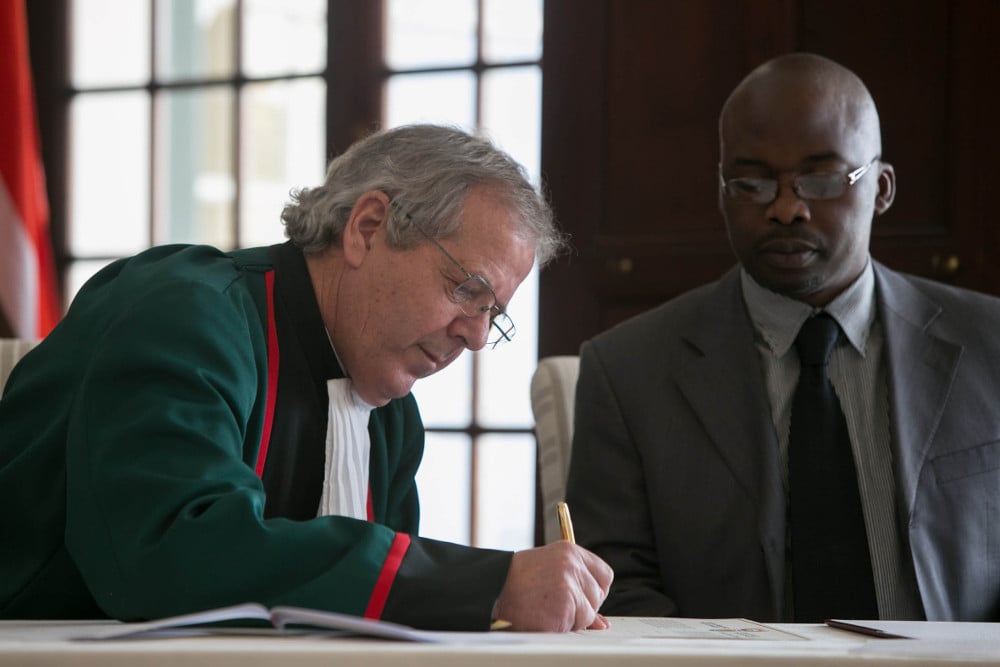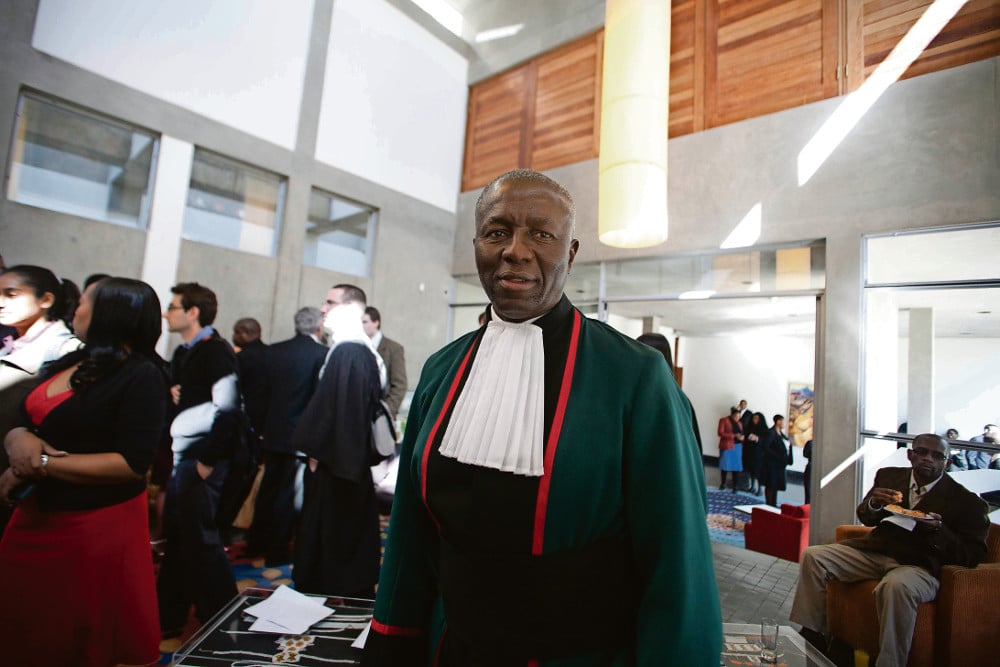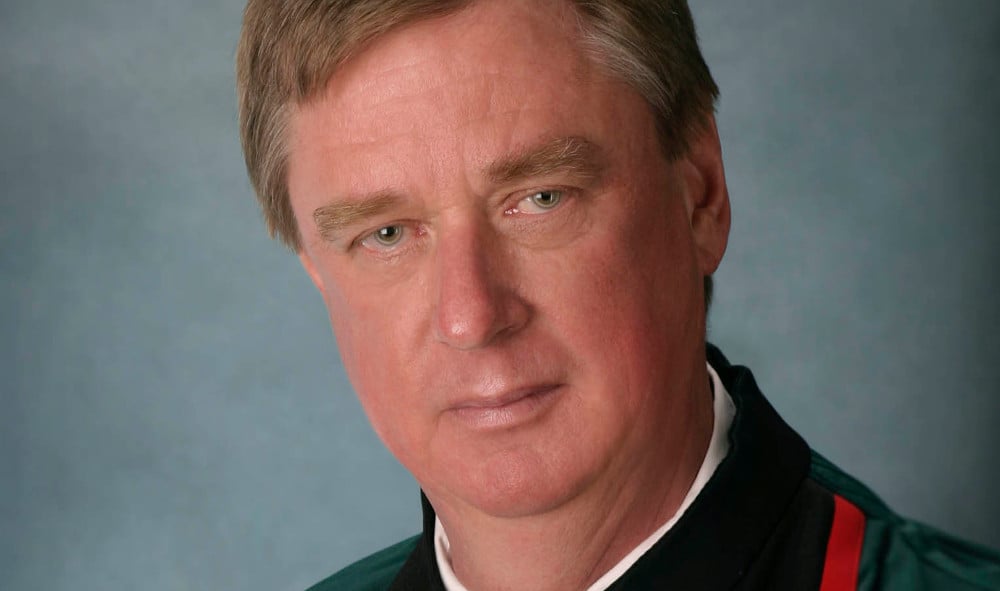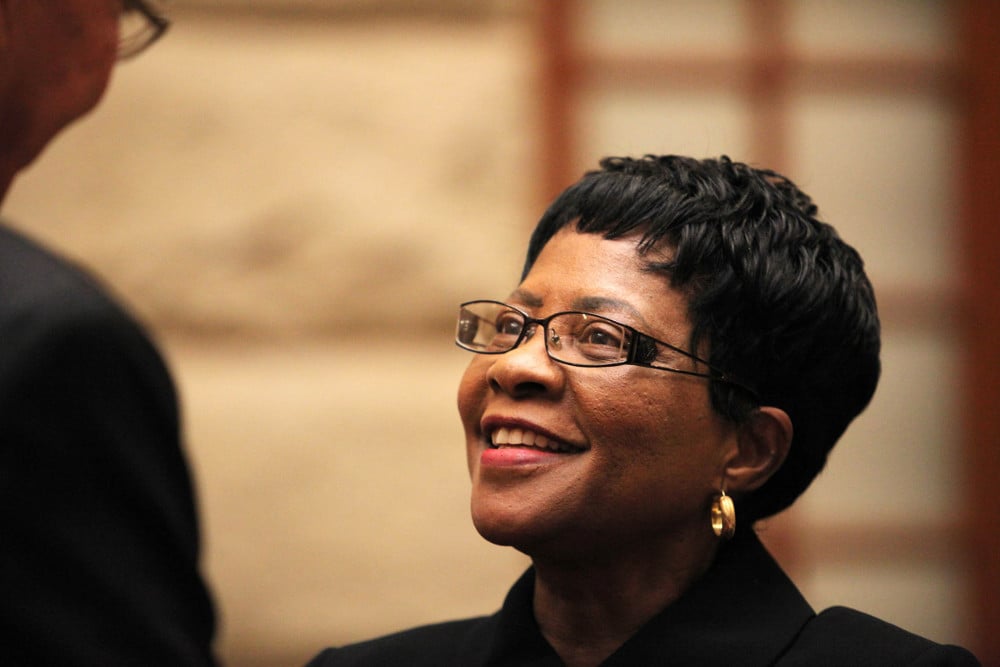When Mogoeng became chief justice
An outspoken chief justice who allegedly raped a sex worker and three Constitutional Court justices accused of being CIA operatives – these are the latest bizarre attempts to smear the country’s top judges. Having gone way beyond the “counter-revolutionary” accusations of old, some of the claims received the attention of the inspector general of intelligence.
In an interview with the Mail & Guardian this week, Chief Justice Mogoeng Mogoeng spoke about the alleged attempts to frame him in July last year – not once, but twice.
When Mogoeng was nominated and then appointed as the chief justice in September 2011, he was widely expected to be President Jacob Zuma’s lackey, but he has since proved some detractors wrong and in the process, it appears, may have made enemies (See below – The ‘puppet’ who tore off his strings).
Mogoeng publicly hinted in September last year that something was amiss, but stopped short of providing details.
He told a panel discussion on the topic of the International Criminal Court and Africa that it was necessary for him to be “frank” even though this could be dangerous.
‘Desperate attempts’
The audience, which included the former United Nations High Commissioner for Human Rights, Judge Navi Pillay, heard that as a result of his frankness there were “very desperate attempts to frame me for criminal acts you can’t even begin to imagine”.
This was dismissed by at least one columnist as the chief justice’s “Kebby Maphatsoe moment”, a reference to the deputy defence minister’s accusation that public protector Thuli Madonsela was a CIA plant, for which Maphatsoe was later forced to apologise.
This prompted Mogoeng’s then spokesperson, Lulama Luti, to issue a statement in which she too referred to attempts to “falsely accuse the Chief Justice of a crime”.
On who wanted to frame him and why, Mogoeng said: “I don’t know. Let me just be economical with words and simply say: there are two incidents, one allegedly on the 19th [July] and the other five days later.”

Judge Johan Froneman. (Clarissa Sosin)
Mogoeng, a devout Christian and family man, was referring to the claim that he had raped a sex worker at a house party in Ormonde, southern Johannesburg, and was arrested. The other claim was that his official vehicle was involved in an attempted hijacking in Johannesburg.
CCTV footage of the attempted hijacking in Sandton showed that the vehicle was identical to Mogoeng’s official vehicle and sported the same number plates.
Alarm bells went off as Mogoeng and his vehicle were actually in the North West that day.
A few reporters gathered at the Booysens police station on the evening of July 21 to witness the chief justice’s alleged fall from grace, but left empty-handed. It has since transpired that the suspect in the alleged rape was a 42-year-old named Justice, although there was no trial.
‘Difficult to speculate’
On who was behind the attempt to frame him and why, Mogoeng said: “I honestly don’t know why. It’s always very difficult to speculate. I don’t know whether those allegations are dead permanently or [if] they are kept at bay for the right time.
“But one thing I need to make clear, I had to mention them publicly so that if at some stage somebody seeks to use them against me, it must never look like I knew the allegations to be so true – that, vocal as I have projected myself to be, on these allegations which are against me I chose to keep quiet, so that nobody ever gets to know about them.”
Mogoeng said he was at a point where “I am vigilantly quiet about these developments, so that those behind them can at a time they consider appropriate raise them … that is where we are going to square up”.

Judge Dikgang Moseneke. (Oupa Nkosi, M&G)
On whether he had raised this with Zuma or the justice and police ministers, he said: “If there is anybody who needed to be made aware of these allegations, they have been made aware and that’s where I leave it.”
He had “never heard anything from anybody”, except a report from officials in his office that he had been arrested, Mogoeng said. “Nobody, nobody from the law enforcement machinery ever approached me about these things.”
Other targets
On whether any of his predecessors had been similarly targeted, Mogoeng said he was not aware.
Asked whether any active judge on the Bench had been a victim of an attempted smear, Mogoeng mentioned that his deputy, Dikgang Moseneke, and two Constitutional Court justices, Johann van der Westhuizen and Johan Froneman, had been accused of being CIA spies.
The allegations were first contained in a so-called intelligence report, widely regarded as bogus. It was made public by then-suspended Cosatu general secretary Zwelinzima Vavi in August 2013 to prove that some in the federation were out to get him. The State Security Agency denied it was one of its reports.

Judge Johann van der Westhuizen.
Under the headline “Project Just”, the report claims it is run by the United States-based National Endowment for Democracy, “where they have control and influence of the Concourt judges and courts”.
The endowment, founded by the US Congress in 1983, is viewed in some quarters as a front for the CIA to do its work overtly, although this has been denied.
“Johan Froneman, Dikgang Moseneke, Johan [sic] van der Westhuizen. Who are these people? Got them on the system, they have accounts and we have deposited funds in Cayman Islands for services rendered under ‘Project Just’,” the report stated.
‘Loyal to SA’
Mogoeng said he approached Zuma on the issue. “And I said to him [that] a discussion with my colleagues has led us to one conclusion and that is: if they are CIA agents, then they should not be on the Bench, because every judge takes an oath to be loyal to the Republic of South Africa.
“Working for the CIA, against South Africa, immediately disqualifies a judge from being a judge; it’s impeachable misconduct.”
Mogoeng said he had told Zuma that it was necessary that the matter be investigated, “so that if they are innocent, then there is no cloud unduly hanging over their heads and if they are guilty, then they should not continue to stay here and poison the integrity of the judiciary”.

A report by Faith Radebe cleared the judges of accusations that they were CIA operatives. (Gallo)
Shortly before her retirement, the then inspector general of intelligence, Faith Radebe, produced a report. She had presented her findings to Mogoeng and the three judges and had even issued letters to each of the judges that the allegations were false, the chief justice said.
On why he had not followed the same route, Mogoeng said: “When I am involved I never want to look like I’m asking anyone to come up for me. I never want to look like I need a favour from anybody.”
None of the three constitutional justices was prepared to comment beyond what Mogoeng had said.
‘Lowest point’
Advocates for Transformation chairperson Dumisa Ntsebeza SC said if it was true that the intelligence services or others had been used to get to the chief justice “in that kind of way, then we have reached the lowest point in our democracy”.
Solomon Makgale, a spokesperson for national police commissioner Riah Phiyega, said not one, but two sex workers had claimed in a statement to the Booysens police that they had been “raped by Chief Justice Mogoeng Mogoeng”. “I think they thought they had hit the jackpot as they wanted to use the rape allegation to extort money,” he said.
On further investigation police found that the man the women claimed was the chief justice was, in fact, called Justice and had paid the women $50. The women then stopped co-operating with the police. There was also cellphone video footage of the party and it was clear that the sex was consensual.
Makgale said the police had considered charging the women with perjury, but the prosecutor believed there was insufficient evidence.
He did not believe this was an attempt to frame the chief justice by someone in crime intelligence, even though some reporters were tipped off about Mogoeng’s imminent arrest and had waited at the police station.
The presidency did not respond to questions, referring the matter instead to the State Security Agency. No response was received at the time of going to press.
Widespread CIA smears don’t stick
The Constitutional Court judges Dikgang Moseneke, Johann van der Westhuizen and Johan Froneman are not the only people to have been accused of being CIA spies – so have public protector Thuli Madonsela, Economic Freedom Fighters leader Julius Malema, former Democratic Alliance parliamentary leader Lindiwe Mazibuko and Association of Mineworkers and Construction Union president Joseph Mathunjwa. All have denounced the claims as ludicrous.
But it resulted in the State Security Agency (SSA) announcing earlier this year that it would launch an investigation into the claims, which appeared on an anonymous blog. This week, the agency’s spokesperson, Brian Dube, said the investigation was ongoing and, other than that, “there’s not much to say”.
It was not the first time that Madonsela has been accused of working for the CIA. In September last year, at an Association of Public Accounts Committees conference, she told delegates that attacks on her office had reached a “bizarre” level, including the emergence of a controversial intelligence report claiming to provide evidence that she was a CIA spy.
Business Day quoted her as saying that among the “evidence” in the spy report was a purported conversation between her and a judge, whom she later confirmed was Moseneke. Madonsela said she had been told that the documents were being circulated among senior ANC leaders.
Her office said she had received no feedback from the SSA. She had also written to the National Assembly speaker Baleka Mbete and Defence Minister Nosiviwe Mapisa-Nqakula about it but had also received no response.
Regarding what exactly the claims about Moseneke were, Madonsela’s spokesperson, Oupa Sekgalwe, said the public protector preferred not to involve other people’s names as “communicating what you know are malicious rumours constitutes defamation of character”. However, Madonsela found the spy claims bizarre.
“Apart from the fact that she has heard from the media that the minister for state security is investigating her based on a dubious blog that mushroomed three days before the State of the Nation address [Sona] and ceased activity a day after the Sona, there was also a Twitter account by the same person, which also mushroomed three days before the Sona and stopped activities about four days after Sona,” Sekgalwe said.
Madonsela also had information that high-profile people were spreading the rumours to journalists and others, and was in possession of three different versions of the spy documents, which were not in sync with each other.
“The allegations or narrative in each version do not need a rocket scientist to understand that it’s all made up and constitutes a poor, amateur attempt at framing the public protector and others,” he said.
The ‘puppet’ who tore off his strings
When Mogoeng Mogoeng was nominated and then appointed in September 2011 as the country’s chief justice, he was widely perceived as President Jacob Zuma’s lapdog on the Bench.
Almost four years into the job, the chief justice has been forthright and independent, to the apparent consternation of some in the establishment and relief from his erstwhile critics.
In a two-hour interview this week, Mogoeng reflected on his nomination and appointment that had resulted in unprecedented personal attacks.
“Quite a number of people would have had the nation believe that I was so incompetent that nothing of substance could reasonably be expected of me in relation to the jurisprudence of this court,” he said.
On whether he had bent over backwards to prove his critics wrong, Mogoeng said: “I never believe in succumbing to pressure. I actually believe that one of the biggest betrayals that a person can ever commit is to seek to behave in a manner that he or she is not convinced is the way to go, but doing it simply to secure the approval of critics and the many aspirant kingmakers out there.
“I don’t believe in doing things to be applauded; with all my shortcomings, I believe in doing things that I believe need to be done.”
Mogoeng said he dealt with issues “frontally”.
“By the way, it’s not only the state that has the capacity to make life uncomfortable for judicial officers to the point of some of them deciding differently from the way they ought.
“Anybody, in any institution that wields power, has the possibility and capacity to bring that into being.
“I’ve been doing my job … it’s just that people were far in the extreme.
“Some of them just can’t imagine this person, who was a perfect puppet in their thinking, turning into something radical and different from what they thought he was ever capable of becoming, but I have always been myself consistently.”
On his efforts to secure the institutional independence of the judiciary, Mogoeng said some critics had accused him of wanting to create an empire when all he was trying to do was to ensure an independent administration for the judiciary.
On the fact that there are those who view him as being “bereft of diplomacy”, Mogoeng said it was only when “I’ve done all I could in private, to achieve whatever I seek to achieve and I am satisfied that nothing more can be achieved, that I pursue a route that some might mistakenly label as confrontational or militant”.
This was the case when he chose to speak frankly at Unisa last year and in effect questioned Justice Minister Michael Masutha’s commitment to the institutional independence of the judiciary.
It did not endear him to Masutha and officials in the department hit back, suggesting that while Mogoeng was pontificating about dictatorships in Africa, he had no problem communing with the controversial chief justice of Swaziland, Michael Ramodibedi, at a church service in Mbabane.
Mogoeng had been asked to mediate in Swaziland by the Southern African Development Community’s society of lawyers, his colleagues at the Constitutional Court as well as other lawyers’ forums.
After the Ramodibedi meeting that also included the Swazi justice minister, Mogoeng said he had suggested they go to church.
“I don’t see anything sinister about that. We could just as well have gone to the stadium to watch soccer. I think there are a number of people who are too uncomfortable about my exercise of freedom of religion.
“That’s acceptable; not everyone has to agree with me.”
Describing the discussion at Unisa as “very hot”, he said it was understandable that some in the justice department would have been “a bit uncomfortable about what I said, and saw the need to identify what could be used as the basis of criticising me”.
“I think it’s normal; it’s a democracy.”
Follow Angela Quintal on Twitter at @angelaquintal.